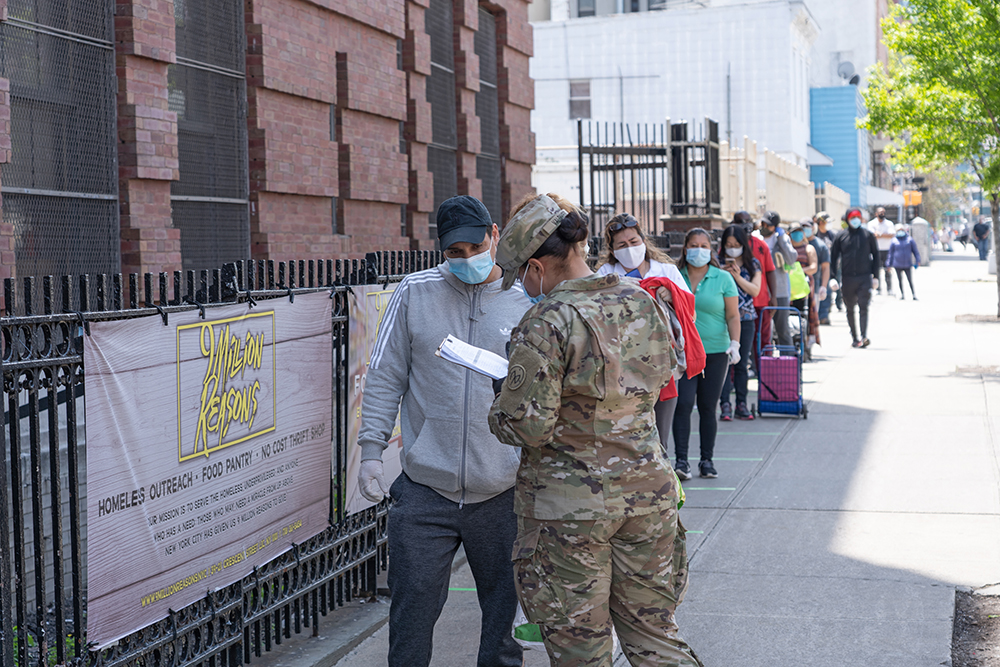Comptroller Stringer and Public Advocate Williams Call on the City to Ramp Up and Streamline Emergency Food Programs Amid COVID-19 Pandemic

30 percent of New York City food pantries have ceased operations since the outbreak of COVID-19
Disconnected seniors who do not live in senior residences or participate in City-sponsored programs may not know that they may be eligible for food delivery assistance.
Concerns about the quality, nutritional value, diversity and appropriateness of the food being provided
(New York, NY) – New York City Comptroller Scott M. Stringer and New York City Public Advocate Jumaane Williams sent a joint letter to COVID-19 Food Czar and New York City Department of Sanitation Commissioner Kathryn Garcia calling on the City to ramp up and streamline emergency food programs amid the COVID-19 pandemic. The letter raises concerns about growing challenges the City is facing in getting sufficient food to those in need as unemployment skyrockets, salaries are slashed, and thousands of residents are sheltering in place.
Comptroller Stringer and Public Advocate Williams urged the City to implement a series of suggestions to ensure that the City’s food systems meet rising needs, including increasing food pantry access, reaching out to disconnected seniors, and ensuring a wider range of options in food programs.
“As we continue to battle COVID-19, countless New Yorkers are grappling with food insecurity as they can no longer afford to buy enough food or simply can’t leave their homes to get it,” said New York City Comptroller Scott M. Stringer. “Commissioner Garcia has done great work increasing our City’s food distribution network in response to COVID-19, but we have to do more to make sure we reach every New Yorker in need across the five boroughs. We are in the midst of a public health crisis, and we must do everything in our power to ensure no New Yorker goes hungry and every family has nutritious, high-quality food to put on the table.”
“As the COVID-19 pandemic has a devastating health impact on lower-income communities, communities of more color, and seniors, those same communities are facing the compounded crises of food insecurity,” said Public Advocate Jumaane D. Williams. “The city needs to expand and expedite its efforts to ensure that vulnerable impacted communities have sufficient information about, access to, and quality of nutritious food for their families as part of a holistic public health response to this crisis.”
Comptroller Stringer and Public Advocate Williams outlined the following recommendations:
Food Pantry Access
More than 30 percent of New York City food pantries have ceased operations since the outbreak of COVID-19. These pantry closures are creating increased demand on the pantries that are still operating, and also creating “food pantry deserts” in neighborhoods where there are no or very few food pantries in operation.
- As part of the City’s increased investment in food pantries, the City should conduct an assessment of neighborhoods and communities that have few pantry resources but high food insecurity. The City should invest in creating new emergency programs or reopening shuttered ones in these areas.
Disconnected Seniors
Seniors are particularly vulnerable to the impacts of COVID-19, and many are rightly heeding public health guidance and staying home. This has created a huge increase in demand for home delivered meals and groceries for seniors. While seniors who attended senior centers before COVID-19 struck have transitioned to home delivered meals, and an effort has been announced to bring food delivery to all NYCHA senior buildings, unaffiliated or disconnected seniors who do not live in senior residences or participate in City-sponsored programs may not know that they may be eligible for food delivery assistance.
- The City should undertake a public information campaign via robocalls, text messaging, door hangers, radio and television announcements, or any other appropriate communication channels to ensure that seniors who do not have the resources to obtain their own food delivery know that the City is here to fill that gap.
- The City should be assessing how the multiple private and City-funded food programs, including DOE Grab and Go sites, food pantries, Get Food NYC, home delivered meal programs, and other initiatives are working alongside each other, and identify service gaps that still need to be filled.
Increasing Choice and Quality
As New Yorkers remain at home for an increasing length of time, the need for choice and diversity in food programs will grow. The increase in kosher and halal food programs, as well the diversification of vendors supplying food for home delivery, is an important and welcome improvement. However, the Comptroller and the Public Advocate’s offices have both received numerous complaints about the quality, nutritional value, diversity and appropriateness of the food being provided.
- The City should create multiple meal pathways to meet the diverse needs of New Yorkers – including cooked meals, pantry staples and fresh produce – to the fullest extent possible.
- The City should make additional efforts to engage with representatives of communities with specific dietary needs, including but not limited to communities that require halal, kosher, and vegetarian foods, to obtain feedback about the current food offerings and take recommendations to ensure that high quality, culturally appropriate food is being provided.
To read Comptroller Stringer and Public Advocate Williams’ letter to Commissioner Garcia, click here.
###